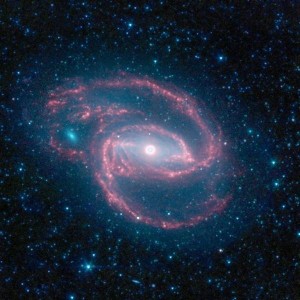 |
|
約4700万光年離れた銀河の中心に存在する超巨大ブラックホールが太陽の1億4千万倍の質量を持つことを、総合研究大学院大などのチームが南米チリのアルマ望遠鏡による観測で突き止めた。米天体物理学誌に発表した。 チームは星が円盤状に分布し、中心部に細長く伸びた構造を持つ棒渦巻き銀河「NGC1097」の電波を観測。分子ガスの分布や動きのデータから、中心にある超巨大ブラックホールの質量を算出した。 アルマ望遠鏡は感度が高く、ガスの速度を精密に測定できる。わずか2時間程度の観測で、計算に必要なデータが得られた。 質量の測定には星の運動を利用する方法などがあるが、銀河の種類によっては計算が難しい。今回の方法を使い、渦巻き形の銀河で超巨大ブラックホールの質量を精密に測定したのは初という。 銀河中心部の質量や明るさと、超巨大ブラックホールの質量には関連があるとされ、研究成果は銀河やブラックホールの進化の仕組みの解明につながると期待される。 ・・・ このブラックホールってやつ、本当におもしろい。別名「神の粒子」と呼ばれるヒッグス粒子は、この中では一体どういう挙動をしているのだろうか。そこでヒッグス粒子とブラックホールの関係について調べてみると、実に恐るべきことが書かれているサイトが見つかった。 かの有名な理論物理学者スティーブン・ホーキング博士が次のように警告している。 ヘタにいじると、宇宙空間と時間が一瞬にして消滅するぞ! 早速、クリップしておく。要必見! 以下、引用開始 ・・・ Finding the ‘God’ particle could destroy the universe, warns Stephen Hawking
・The Higgs boson ‘God particle’ could destroy the universe, Hawking says ・Space and time could suddenly collapse – and ‘we would not see it coming’ ・If scientists put too much energy in the Higgs boson the universe could end ・Disaster very unlikely as physicists do not have large enough collider
The elusive ‘God particle’ discovered by scientists in 2012 has the potential to destroy the universe, Professor Stephen Hawking has warned. At very high energy levels, the Higgs boson could cause space and time suddenly collapse – and ‘we wouldn’t see it coming’, the former Cambridge professor of mathematics says. The God particle, which gives shape and size to everything that exists, could cause a ‘catastrophic vacuum delay’ if scientists were to put it under extreme stress. A disaster like this is very unlikely for the time being as physicists do not have a particle accelerator large enough create such an experiment, but Prof Hawking’s comments have excited scientists, the Sunday Times reported. The theoretical physicist wrote his thoughts on the Higgs boson in the preface to a new book, Starmus, a collection of lectures by scientists and astronomers including Neil Armstrong, Buzz Aldrin, Queen guitarist Brian May. Prof Hawking wrote: ‘The Higgs potential has the worrisome feature that it might become megastable at energies above 100bn giga-electron-volts (GeV). ‘This could mean that the universe could undergo catastrophic vacuum decay, with a bubble of the true vacuum expanding at the speed of light. ‘This could happen at any time and we wouldn’t see it coming.’ The professor did add sarcastically, however, that such an event is unlikely in the near future. He said: ‘A particle accelerator that reaches 100bn GeV would be larger than Earth, and is unlikely to be funded in the present economic climate.’ Professor John Ellis, a theoretical physicist at Cern, said: ‘One thing should be made clear. The discovery of the Higgs boson at the Large Hadron Collider (LHC) did not cause this problem, and collisions at the LHC could not trigger the instability, because their energies are far too low.’ Particle accelerators make subatomic particles travel at greater and greater speeds as they are pumped with more energy before smashing them together. Scientists do this to try and spot tiny fragments of particles which fly off, and it is how the Higgs boson was discovered at the Cern LHC in Switzerland in 2012. In that experiment, physicists noticed unexpected debris from the collisions that fitted with what British scientist Peter Higgs had predicted in the early 1960s. The Higgs boson particle is thought to be part of the mechanism that gives matter its mass, but scientists do not fully understand it yet. |
-
アーカイブ
- 2021年4月
- 2021年2月
- 2021年1月
- 2020年5月
- 2020年4月
- 2020年1月
- 2019年12月
- 2019年11月
- 2019年9月
- 2019年5月
- 2019年1月
- 2018年10月
- 2018年9月
- 2018年8月
- 2018年7月
- 2018年5月
- 2017年11月
- 2017年9月
- 2017年8月
- 2017年7月
- 2017年6月
- 2017年5月
- 2017年4月
- 2017年3月
- 2017年1月
- 2016年12月
- 2016年10月
- 2016年9月
- 2016年8月
- 2016年7月
- 2016年6月
- 2016年5月
- 2016年3月
- 2016年1月
- 2015年12月
- 2015年11月
- 2015年10月
- 2015年9月
- 2015年8月
- 2015年7月
- 2015年6月
- 2015年5月
- 2015年4月
- 2015年3月
- 2015年2月
- 2015年1月
- 2014年12月
- 2014年11月
- 2014年10月
- 2014年9月
- 2014年8月
- 2014年7月
- 2014年6月
- 2014年5月
- 2014年4月
- 2014年3月
- 2014年2月
- 2014年1月
- 2013年12月
- 2013年11月
- 2013年10月
- 2013年9月
- 2013年8月
- 2013年7月
- 2013年6月
- 2013年5月
- 2013年4月
- 2013年3月
- 2013年2月
- 2013年1月
- 2012年12月
- 2012年11月
- 2012年10月
- 2012年9月
- 2012年8月
- 2012年7月
- 2012年5月
- 2012年4月
- 2012年3月
- 2012年2月
- 2012年1月
- 2011年12月
- 2011年10月
- 2011年9月
- 2011年7月
- 2011年6月
- 2011年5月
- 2011年4月
- 2011年3月
- 2011年2月
- 2011年1月
- 2010年12月
- 2010年11月
- 2010年10月
- 2010年9月
- 2010年8月
- 2010年7月
- 2010年6月
- 2010年5月
- 2010年4月
- 2010年3月
- 2010年2月
- 2010年1月
- 2009年12月
- 2009年11月
- 2009年10月
- 2009年9月
- 2009年1月
- 2008年12月
- 2008年11月
- 2008年10月
-
メタ情報
